Difference between revisions of "Agreement of Secrecy"
(→Page 1) |
(→Page 1) |
||
| Line 30: | Line 30: | ||
| style="vertical-align: bottom;" | | | style="vertical-align: bottom;" | | ||
| − | <div style="writing-mode: tb-rl; -webkit-transform: rotate( | + | <div style="writing-mode: tb-rl; -webkit-transform: rotate(90deg); -moz-transform: rotate(270deg); -o-transform: rotate(270deg); white-space: nowrap; display: block; bottom: 0;"> |
B Franklin | B Franklin | ||
Revision as of 13:44, 23 April 2014
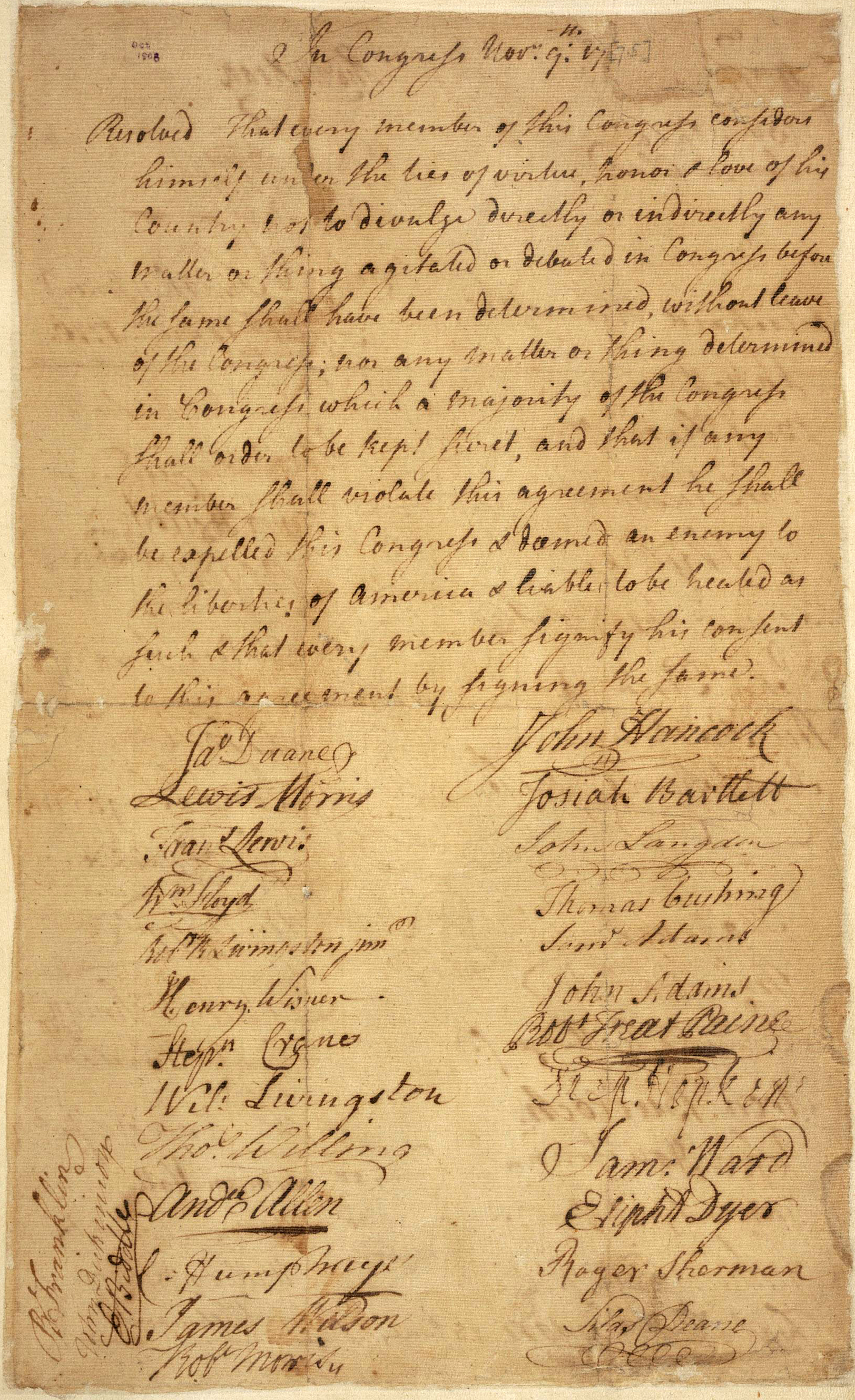
On Tuesday morning, September 6, 1774, the First Continental Congress, convened in Philadelphia's Carpenter's Hall, passed a resolution to keep their proceedings secret:
Resolved, That the door be kept shut during the time of business, and that the members consider themselves under the strongest obligations of honour, to keep the proceedings secret, until the majority shall direct them to be made public.
This resolve was reiterated on May 11, 1775 by the Second Continental Congress, by that time reconvened at the Pennsylvania State House in Philadelphia.[1] John Adams mentions he is under an "engagement of secrecy" in a letter to Elbridge Gerry, dated November 5, 1775:
Dear Sir:
I am under such restrictions, injunctions, and engagements of secrecy respecting every thing which passes in Congress, that I cannot communicate my own thoughts freely to my friends, so far as is necessary to ask their advice and opinions concerning questions, which many of them understand much better than I do. This, however, is an inconvenience which must be submitted to for the sake of superior advantages.[2]
Congress adopted an official "Engagement of the Members to Secresy" on November 9, 1775. The manuscript, now in the United States National Archives, is in the handwriting of secretary Charles Thomson, and was signed by the members then present. Other delegates signed the agreement as they arrived, with the last signatures appended on June 5, 1777. George Wythe and the other members of the Virginia Delegation—Richard Henry Lee, Thomas Jefferson, Benjamin Harrison V, Thomas Nelson, Jr. and Francis Lightfoot Lee—probably signed on or about the 13th of September, when their credentials were presented to and approved by Congress.[3]
The increasing pressure for secrecy during 1774-1775 was in response not only to information leaked in communications from delegates,[4] but to King George III's royal "Proclamation of Rebellion" on August 23, 1775, declaring Congress's activities traitorous, and commanding British "Officers Civil and Military" to suppress rebellion in the Colonies, and "bring the Traitors to Justice."
Contents
Manuscript text, 9 November 1775
Page 1
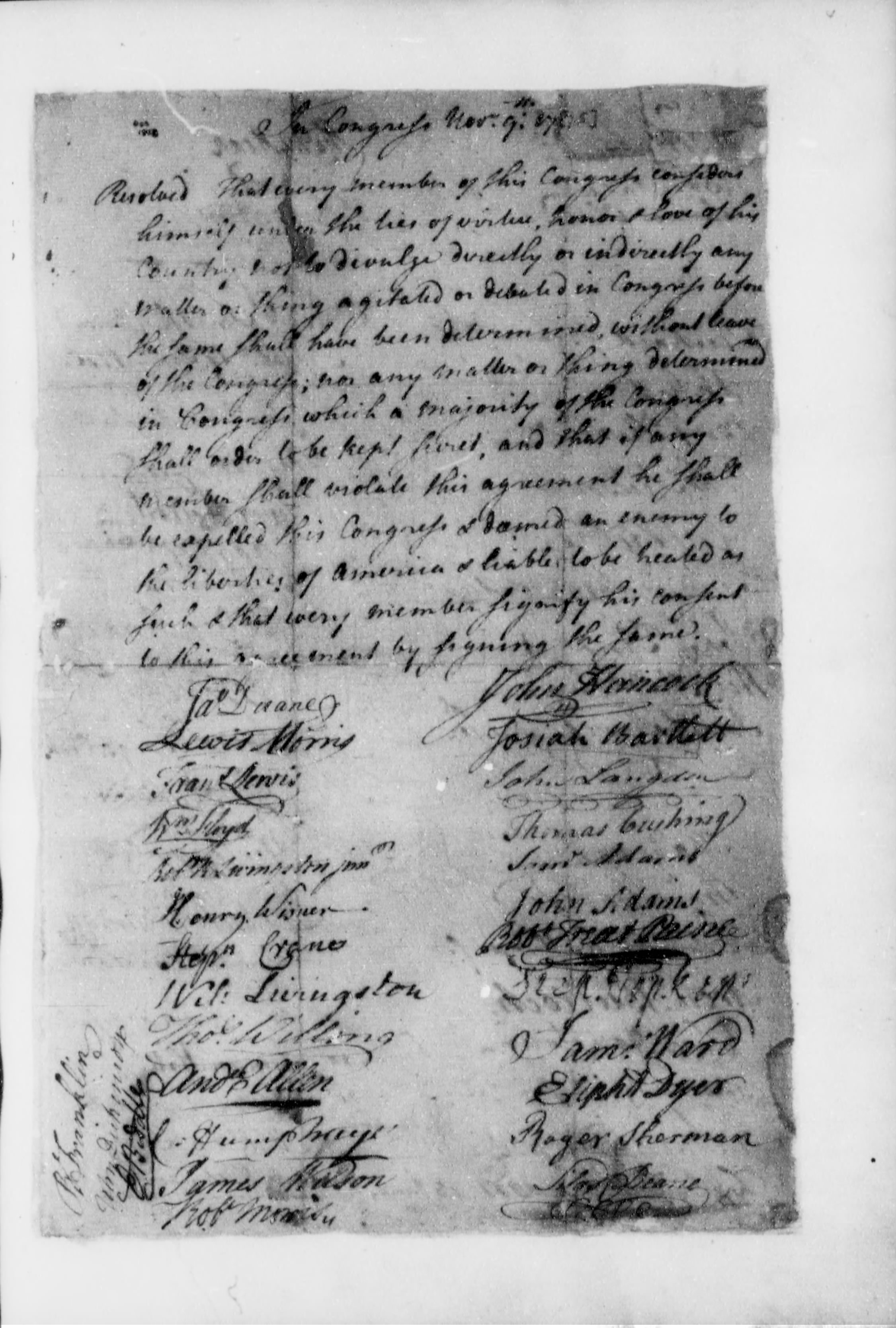
In Congress Nov.r 9.th 17 [75]
Resolved That every member of this Congress considers himself under the ties of virtue, honor and love of his Country not to divulge directly or indirectly any matter or thing agitated or debated in Congress before the same shall have been determined, without leave of the Congress; nor any matter or thing determined in Congress which a majority of the Congress shall order to be kept secret, and that if any member shall violate this agreement he shall be expelled this Congress and deemed an enemy to the liberties of America and liable to be treated as such, and that every member signify his consent to this agreement by signing the same.
B Franklin
John Dickinson
E Biddle
Jas Duane
Lewis Morris
Frans Lewis
Wm. Floyd
Robt R Livingston junr
Henry Wisner
Step.n Crane
Wil: Livingston
Tho.s Willing
And.w Allen
C: Humphreys
James Wilson
Robt Morris
John Hancock
Josiah Bartlett
John Langdon
Thomas Cushing
Saml Adams
John Adams
Robt Treat Paine
Step. Hopkins
Sam. Ward
Elipht Dyer
Roger Sherman
Silas Deane
Page 2
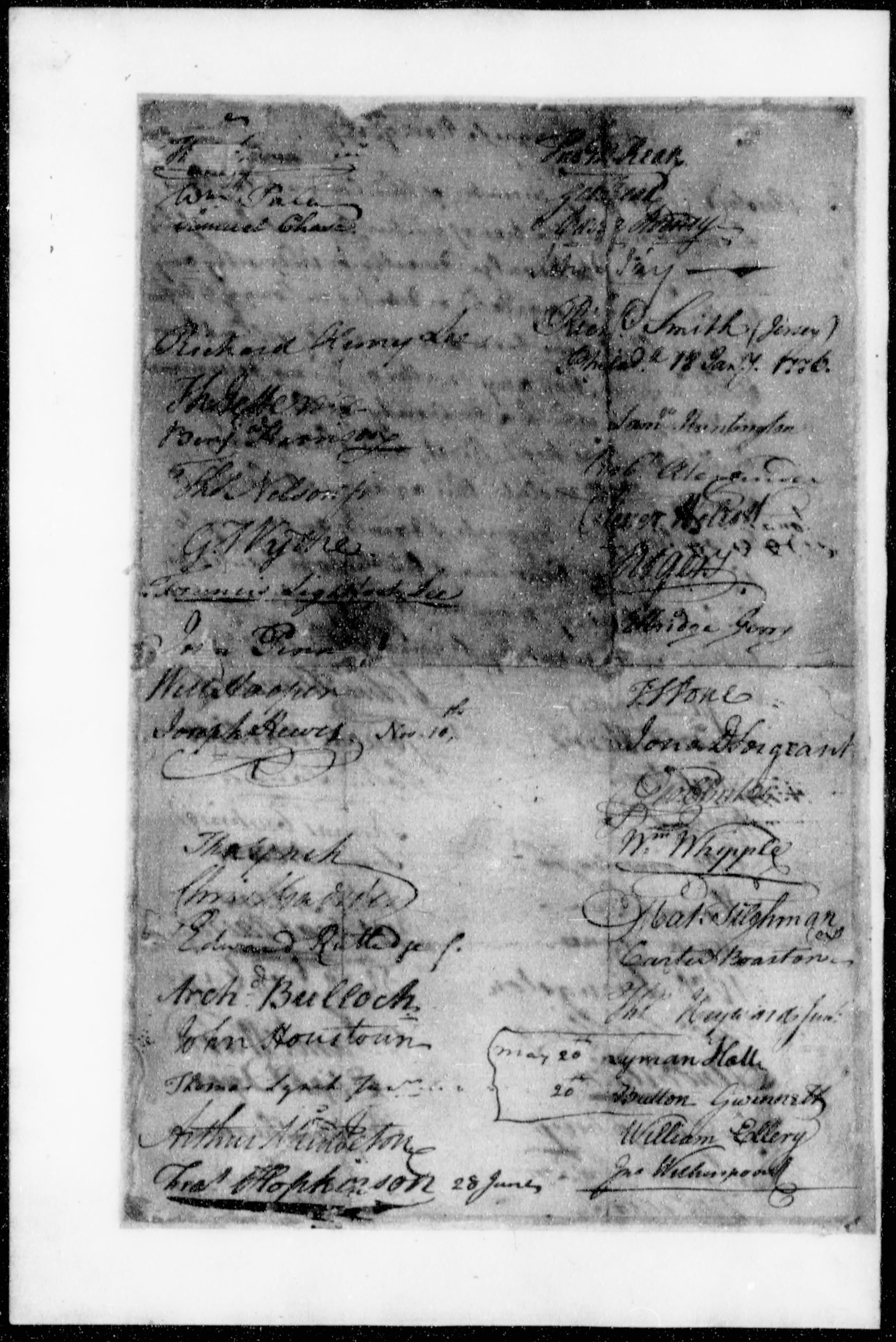
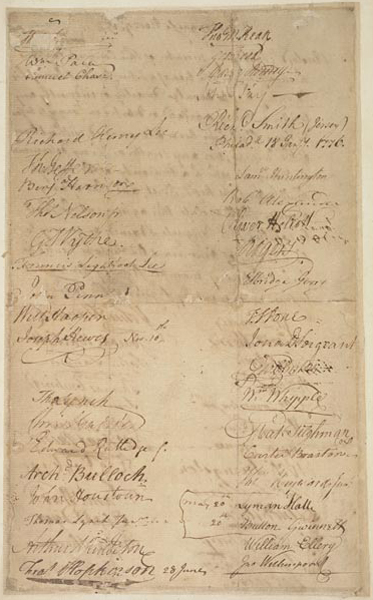
Th Johnson Junr
Wm Paca
Samuel Chase
Richard Henry LeeTh: Jefferson
Benja Harrison
Thos Nelson jr
G Wythe
Francis Lightfoot Lee
John Penn
Will Hooper
Joseph Hewes Nov. 10.th
Tho LynchChrist Gadsden
Edward Rutledge
Arch:d Bulloch
John Houstoun
Thomas Lynch Junr
Arthur Middleton
Fras. Hopkinson 28 June
Thos M:Kean
Geo: Read
Cæsar Rodney
John Jay
Rich:d Smith (Jersey)
Philad.a 18 Jany. 1776.
Saml HuntingtonRob.t Alexander
Oliver Wolcott
J Rogers
Elbridge Gerry
T: StoneJona D Sergeant
Geo: Clinton
W:m Whipple
Mat. Tilghman
Carter Braxton
Thos Heyward Jun:r
{ May 20th Lyman Hall
{ 20th Button Gwinnett
William Ellery
Jno Witherspoon
Page 3
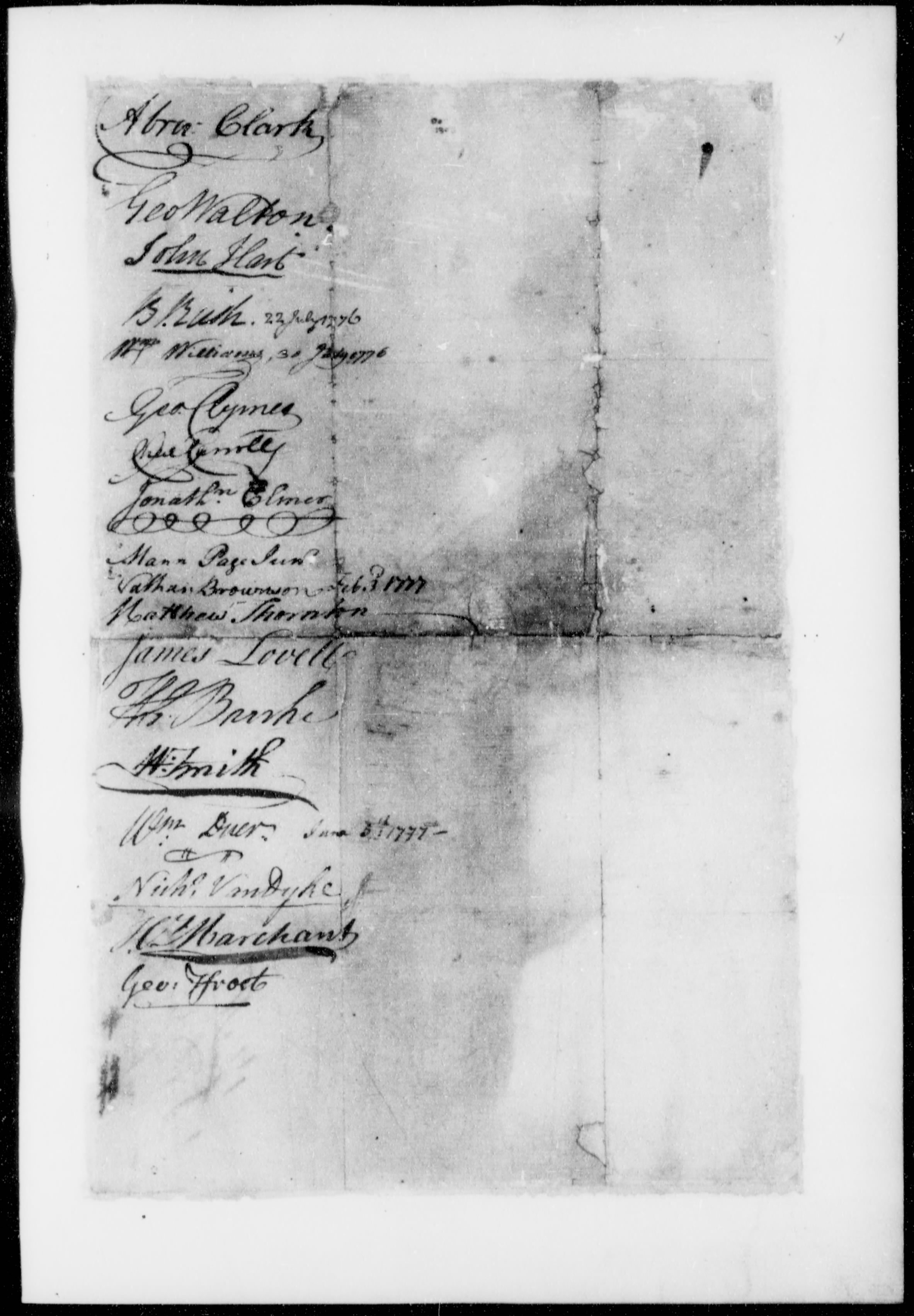
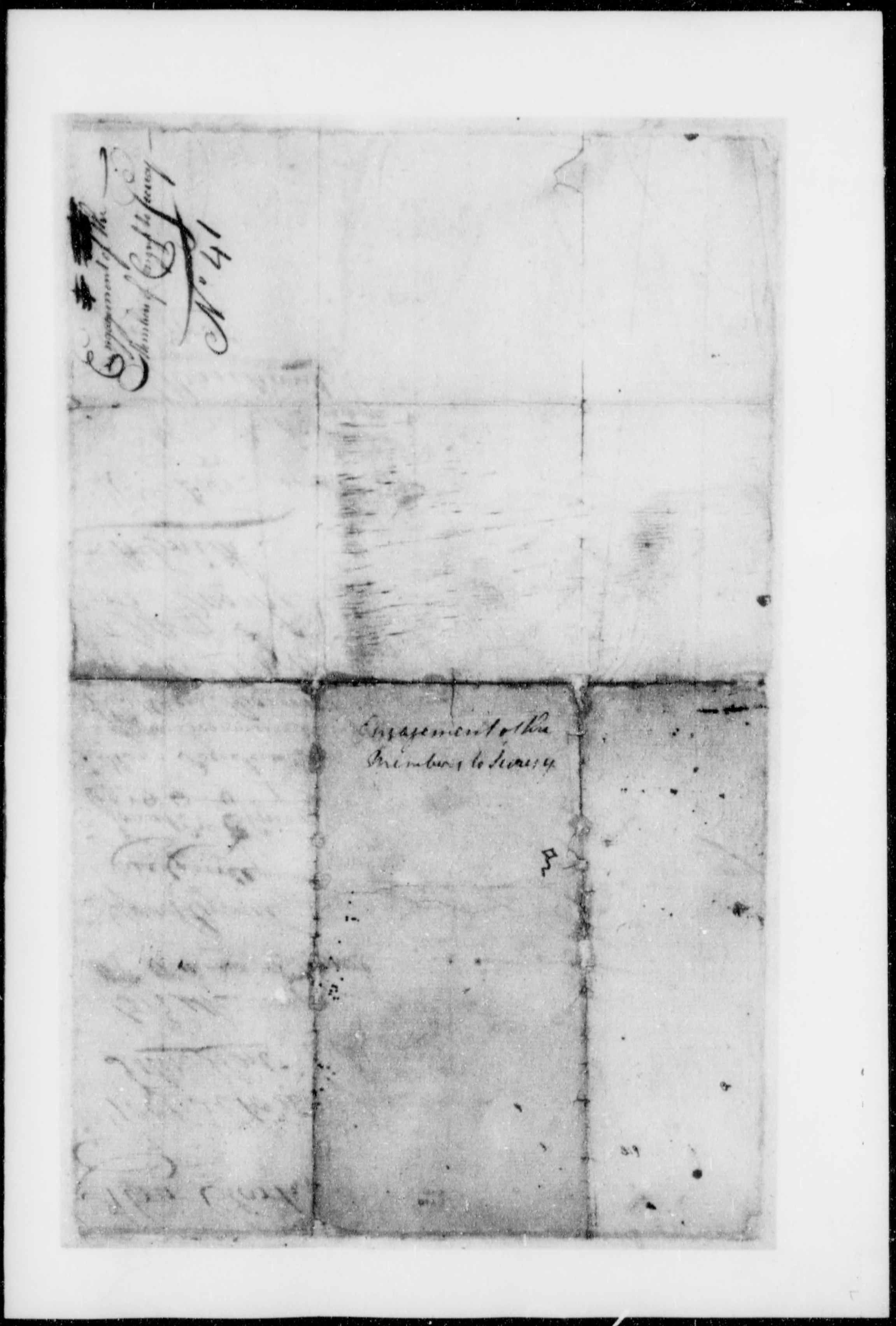
Abra: Clark
Geo Walton
John Hart
B Rush. 22 July 1776
Wm. Williams, 30 July 1776
Geo. Clymer
Chas. Carroll
Jonath.n Elmer
Mann Page Junr
Nathan Brownson Feb 3d 1777
Matthew Thornton
James Lovell
Tho. Burke
W: Smith
W:m Duer June 5:th 1777
Nich.s VanDyke
Hy Marchant
Geo: Frost
References
- ↑ Journals of the American Congress: from 1774 to 1788, vol. 1, From September 5, 1774, to December 31, 1776, Inclusive (Washington, D.C.: Way and Gideon, 1823), 7, 55.
- ↑ Edmund Cody Burnett, ed., Letters of Members of the Continental Congress, vol. 1 August 29, 1774, to July 4, 1776 (Washington, D.C.: Carnegie Institution of Washington, 1921), 249. See also 255n2, for Adams' mentions of secrecy.
- ↑ Journals, 137.
- ↑ John Adams, writing to James Warren on October 2, 1775, said: "Our Obligations of Secrecy are so braced up, that I must deny myself the Pleasure of Writing Particulars. Not because some Letters have been intercepted, for notwithstanding the Versification of them, they have done good, tho they have made some People grin." Burnett, Letters, 213-214.
External links
- Continental Congress: Agreement of Secrecy, 9 November 1775, Founders Online, National Archives.
- The Order of the Descendants of the Signers of the Secret Pact or Prior Declaration of Independence, at the Internet Archive.